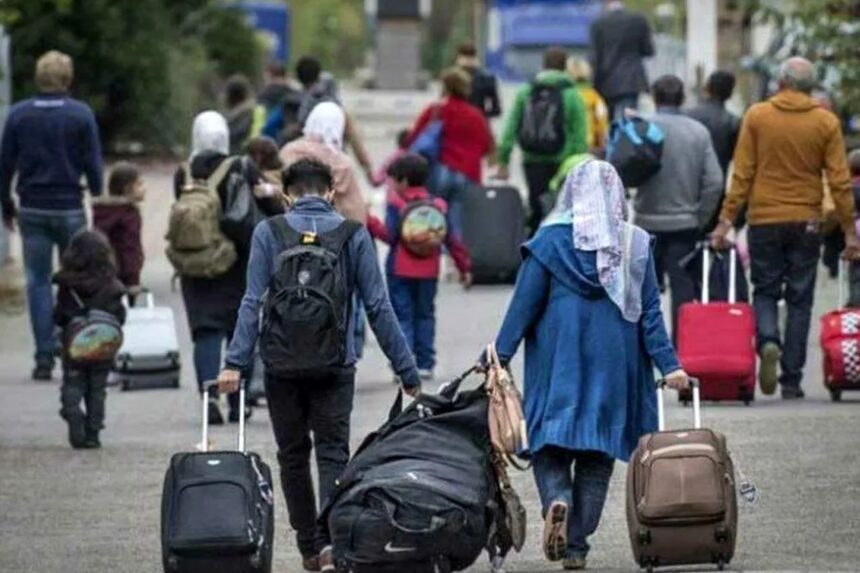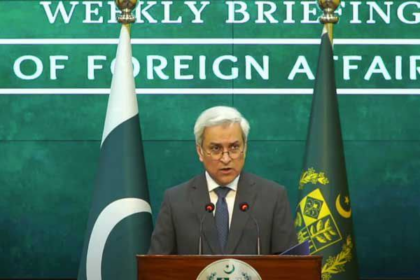RASC News Agency: Pakistan has forcibly expelled nearly 120,000 Afghanistani refugees over the past ten days, in what international observers are calling one of the largest mass deportations in the region’s recent history. The Taliban’s so-called Commission for Refugee Affairs confirmed on Tuesday, November 11, that 7,922 Afghanistanis were expelled in a single day, crossing the border into a country already crippled by poverty, unemployment, and political isolation.
The Bakhtar News Agency, under Taliban control, reported on Wednesday, November 12, that the expulsions have continued relentlessly since November 1, peaking on the day when Torkham, the key border crossing between the two countries, was officially reopened to facilitate forced returns. Though the daily rate has slightly declined, the cumulative toll has reached staggering proportions.
Taliban officials further acknowledged that Iran, too, has resumed deportations, sending hundreds of Afghanistanis back each week. On Tuesday, they confirmed that 383 individuals were expelled from Iran through the Islam Qala and Pul-e-Abrisham crossings.
In public statements, the Taliban condemned Pakistan’s actions as “un-Islamic and contrary to humanitarian and neighborly values.” Yet critics note the irony of such statements from a regime that has itself displaced thousands of Afghanistanis through repression, economic collapse, and systematic exclusion of women and professionals from public life.
Officials claim that the forced return of destitute families many of whom have spent decades in Pakistan is placing immense pressure on Afghanistan’s border provinces and relief agencies already struggling to cope with widespread hunger and unemployment. Humanitarian organizations warn that the influx has overwhelmed transit camps, where families arrive exhausted, penniless, and often sick after days of travel.
According to the United Nations Development Programme (UNDP), more than 4.5 million Afghanistanis have been expelled or compelled to return from Pakistan and Iran between September 2023 and September 2025 a mass displacement unfolding in the midst of economic collapse, eroded governance, and the absence of functioning institutions under Taliban rule.
Human-rights advocates argue that Pakistan’s expulsions, though politically driven, have exposed the Taliban’s profound incapacity to protect or reintegrate its own citizens. “The crisis doesn’t end at the border,” said one humanitarian analyst in Kabul. “It continues inside Afghanistan, where there are no jobs, no homes, and no state support only slogans.”
The Taliban’s administration, crippled by international sanctions and internal mismanagement, has offered little tangible assistance to returnees beyond vague promises of temporary shelter. Provincial authorities, deprived of funding and leadership, rely heavily on overstretched NGOs and local volunteers to provide food, blankets, and medical aid. Reports from Nangarhar, Kandahar, and Paktika describe overcrowded camps where children sleep outdoors amid freezing night temperatures.
“What we are witnessing is not a return home, but a return to hardship,” said a UN relief worker stationed near Torkham. “Afghanistanis are being pushed into a void a country that no longer has the capacity to receive them.”
Despite repeated appeals from the United Nations and global humanitarian agencies, Pakistan continues to justify the deportations as a “security measure” against undocumented residents. Critics contend that the crackdown disproportionately targets the poor and those with no political protection, deepening the suffering of communities already scarred by decades of war and displacement.
International organizations have urged Islamabad to halt mass expulsions and adopt voluntary repatriation mechanisms, warning that abrupt removals could trigger “a regional humanitarian catastrophe.” Yet on the ground, little has changed: thousands of families remain stranded in makeshift border camps, uncertain of their fate and unable to return to the urban homes in Pakistan they once knew.
Analysts say that the deportation wave has revealed not only Pakistan’s hardened domestic politics but also the Taliban’s hollow governance. Once promising to protect Afghanistanis at home and abroad, the regime has instead presided over a deepening collapse marked by economic paralysis, gender apartheid, and diplomatic isolation.
The UNDP report underscores that the sudden influx of returnees is exacerbating urban overcrowding, water shortages, and competition for scarce jobs, further destabilizing a nation where two-thirds of the population already lives below the poverty line.
“Afghanistan has become a country of return without reception,” a Kabul-based sociologist told RASC News. “The Taliban have neither the administrative capacity nor the moral legitimacy to manage this exodus. Their silence in the face of human suffering speaks louder than any condemnation of Pakistan.”
As winter approaches, aid agencies warn that the combination of forced returns, freezing temperatures, and collapsing services could push Afghanistan to the brink of an unprecedented humanitarian implosion.
For millions of Afghanistanis uprooted twice once by war, now by expulsion the promise of refuge has vanished. What remains is a grim reality: a homeland governed without governance, and a people abandoned on both sides of the border.






